Custom MHC Molecules
Empowering TCR-based research with tailored MHC Solutions
At KACTUS, we specialize in providing high-quality and reliable custom MHC class I and MHC class II complexes to meet your immune monitoring needs. With our extensive expertise in manufacturing MHC tetramers, monomers, and peptide-ready MHCs, we ensure that each product is tailored to your specific requirements.
We understand that accurate antigen presentation is fundamental in immunotherapy research. Our platform supports both Class I MHC and other species alleles and is compatible with T cell receptor detection workflows. Whether your study involves T cells, TCRs, or TCR-mimic antibodies, we offer flexible MHC configurations to support diverse experimental models.
Monomers & Tetramers
Biotinylation & Fluorescence
Class I, and Other Species Alleles
Mammalian or E. coli Expression
6-8 Week Production
SPR Binding Analysis for validating cell surface proteins interaction with T cells

After you submit your request, we'll set up an initial discussion to see what specifications you're looking for and your applications.

We use structural information and our expertise in MHC engineering to produce mammalian-expressed single-chain trimer MHCs or peptide-ready MHCs.

Your product will undergo purity and activity testing depending on the specifications outlined for your application. This may include HPLC, ELISA, or SPR testing services.

We'll deliver the final protein construct and any requested quality data in 6-8 weeks.
For MHC Class II alleles, non-canonical alleles or alleles from other species, please submit our custom MHC request form and we will conduct a feasibility assessment for you.

Monomers
Bacteria-refolded MHC or Mammalian-expressed SCT monomers
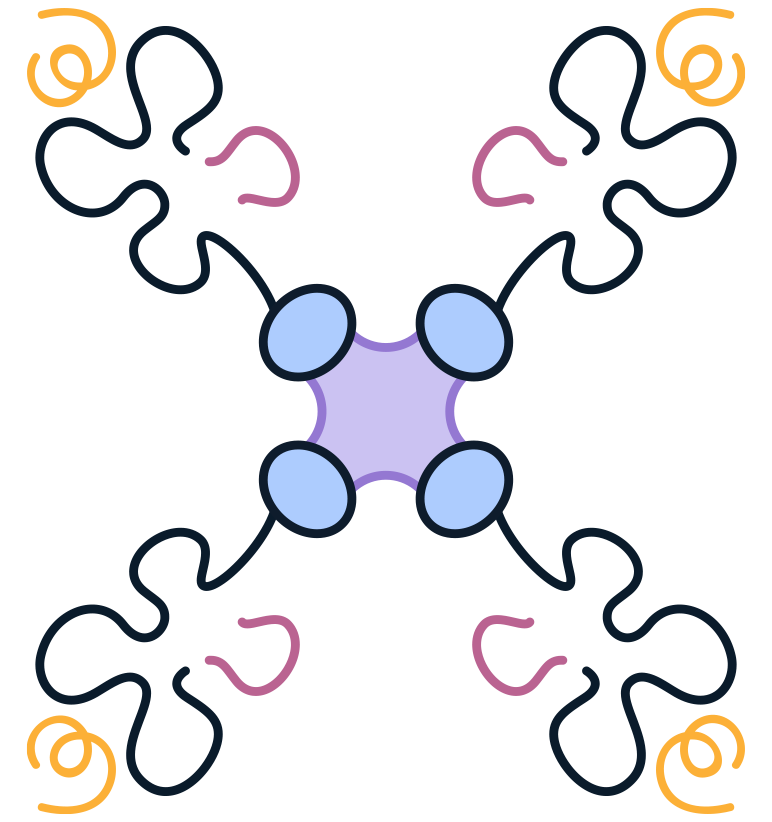
Tetramers
MHC tetramers for enhanced TCR avidity.
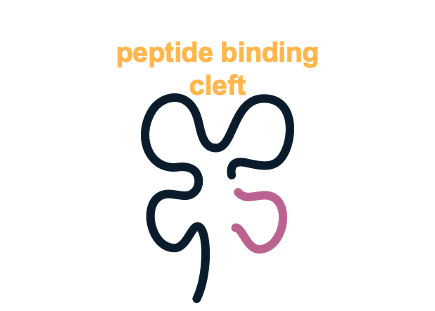
Peptide-ready MHC
Stable, peptide-free MHC for simple loading of your own antigenic peptide

Chimeric MHCs
Human-murine chimeric MHC for efficient TCR-mimic antibody generation
We have creatively engineered species-chimeric MHC-peptide complexes, using a special design to replace MHC α3 or β2M with the corresponding domains from other species. This approach leaves more immunogenicity to the antigenic peptide, increasing the production of effective antibodies, thereby optimizing the screening process and reducing the screening intensity. Our chimeric MHCs are expressed in mammalian cells to maintain their natural conformation and demonstrate good bioactivity.
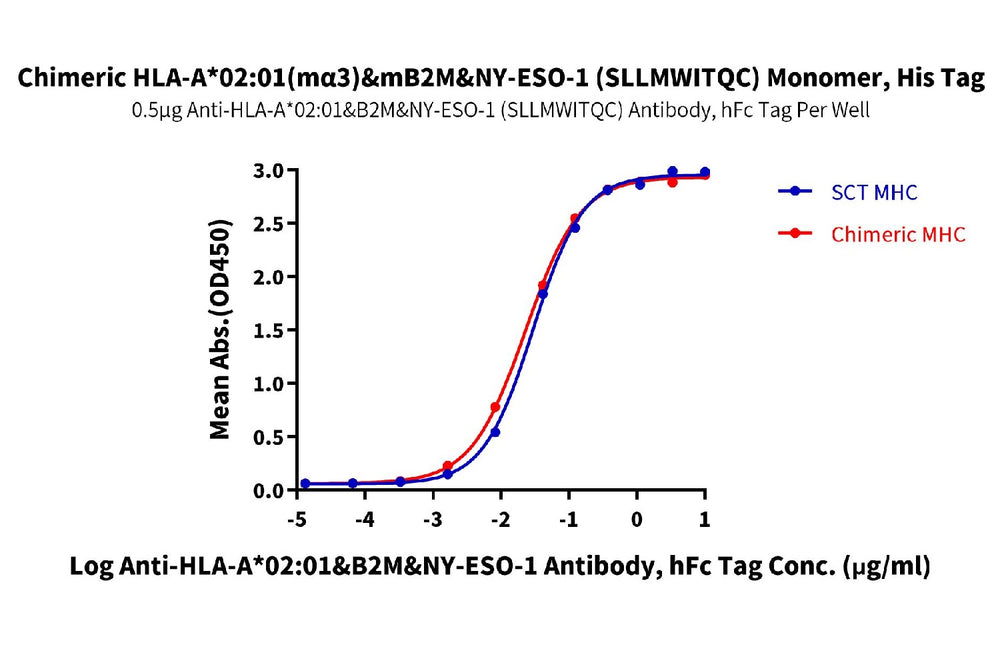
Figure 1. ELISA verification demonstrates that the Chimeric HLA-A02:01(mα3)&mB2M&NY-ESO-1 (SLLMWITQC) Monomer can bind to the HLA-A02:01&B2M&NY-ESO-1 (SLLMWITQC) Antibody. The activity is comparable to that of the non-chimeric HLA-A*02:01&B2M&NY-ESO-1 (SLLMWITQC) Monomer.
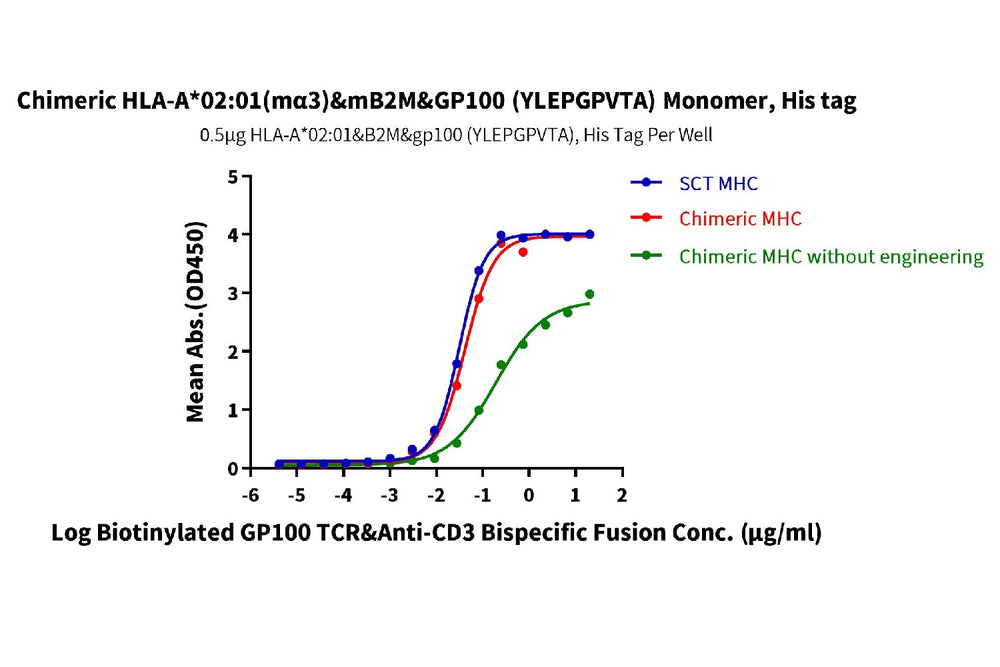
Figure 2. ELISA validation shows that the Chimeric HLA-A02:01(mα3)&mB2M&GP100 (YLEPGPVTA) Monomer can bind to the GP100 TCR&Anti-CD3 Bispecific Fusion. Its activity is comparable to the non-chimeric HLA-A02:01&B2M&GP100 (YLEPGPVTA) Monomer and superior to that of the chimeric monomer without special design.
The discovery and identification of new antigens is an important process in immunotherapy. A key step in this process is detecting binding affinities of antigenic peptides with MHCs and the reactivity to TCRs. We have engineered functional Peptide-ready MHCs (prMHCs), which stabilized, peptide-free MHC monomers or tetramers. These prMHCs are available catalog and custom in Class I and Class II alleles.
Figure 3. Flow cytometry analysis of PE-labeled HLA-A02:01&B2M tetramers binding to Jurkat cells. TCR knockout Jurkat cells showed no significant binding to the tetramers, regardless of peptide presence. In contrast, 1G4 TCR monoclonal Jurkat cells exhibited high specific binding when the tetramers were complexed with the NY-ESO-1 (SLLMWITQC) peptide, while low binding was observed with an irrelevant peptide. This indicates that the loaded prMHC tetramer has high binding affinity with the TCR-expressing cells.
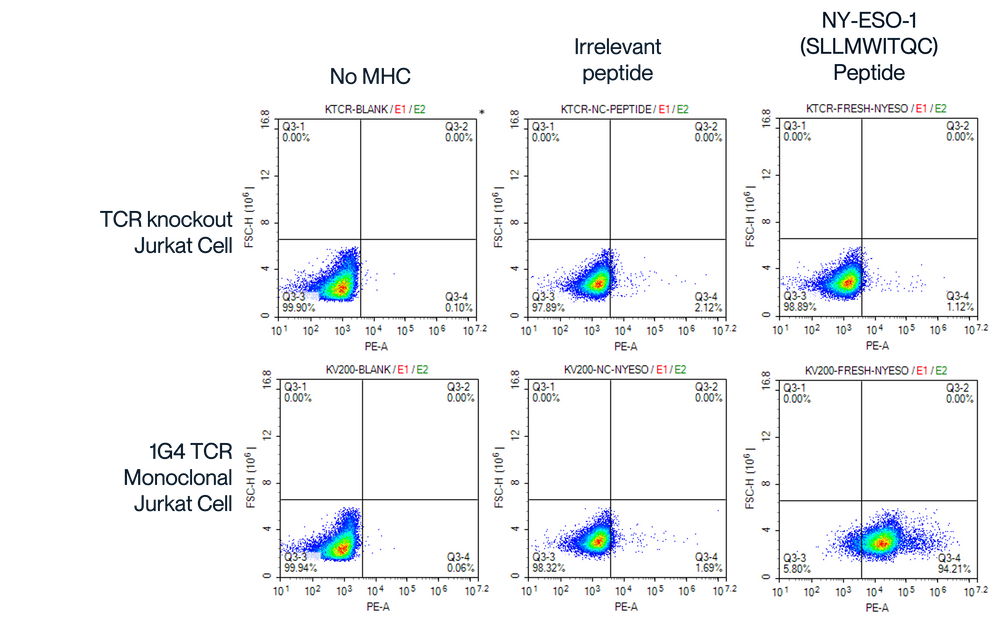
Discover more about our MHC engineering by listening to our Chief Technology Officer, ManHee Suh, as he explains the innovative design of our diverse MHC molecules. Learn how we integrate novel peptide-loading strategies to support antigen processing, cell mediated immunity, and T cell receptor engineering across research involving MHC class I complexes, MHC class II complexes, and custom peptide sequence validation.
Custom MHC molecules are essential tools in immune monitoring, T cell response studies, and antigen discovery. They help identify antigen-specific TCR interactions, making them valuable in immunotherapy research and vaccine development.
We produce MHC monomers, tetramers, peptide-ready MHCs, and chimeric MHCs, all tailored for specific research applications. Formats include biotinylation, fluorescent labeling, and species-specific domain replacements to reduce off-target effects.
We offer a wide selection of Class I, including HLA-A, HLA-B, HLA-C, HLA-E, HLA-G (human) and H-2K, Qa-1b (mouse). Custom alleles from other species can also be requested pending feasibility assessment. We do not currently offer Class II.
We’ll ask for details such as the MHC class, allele type, peptide sequence (if known), desired tags or labels, and your application. This helps us assess feasibility and align with your research goals from the outset.
The standard production timeline is 6 to 8 weeks including shipping, depending on construct complexity, expression system, and any custom labeling or testing requirements.
We offer mammalian expression for natural protein folding (includes PTMs) and E. coli expression for native sequence with no PTMs. The choice depends on the structure, application, and performance requirements of the molecule.
Yes. Products undergo purity and bioactivity validation, which may include ELISA, HPLC, FACS, or SPR analysis, depending on your project specifications.
Peptide-ready MHCs are stabilized, peptide-free MHC monomers or tetramers that allow researchers to load their own antigenic peptides in-house. They’re ideal for antigen screening and TCR specificity studies.
Chimeric MHCs feature species-specific domain substitutions (e.g., human α3 replaced with mouse α3) to reduce non-specific antibody binding. They're especially useful in antibody generation and screening workflows.
Yes. All project-related data, including peptides, sequences, and final constructs, remain confidential and fully owned by you. We also accommodate confidentiality agreements when required.